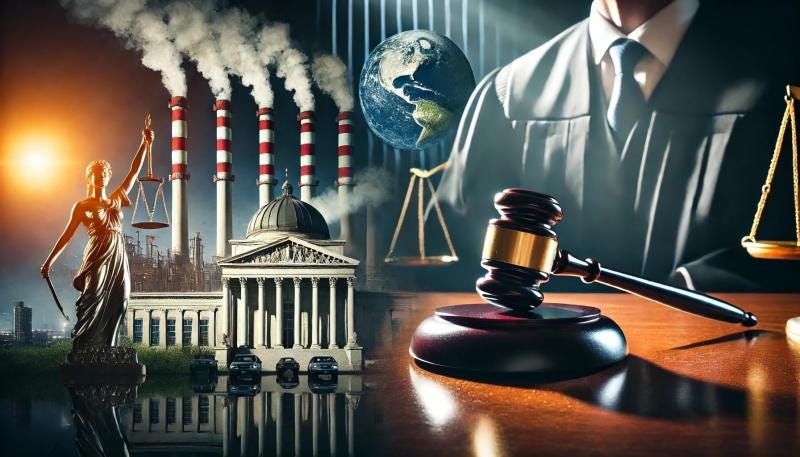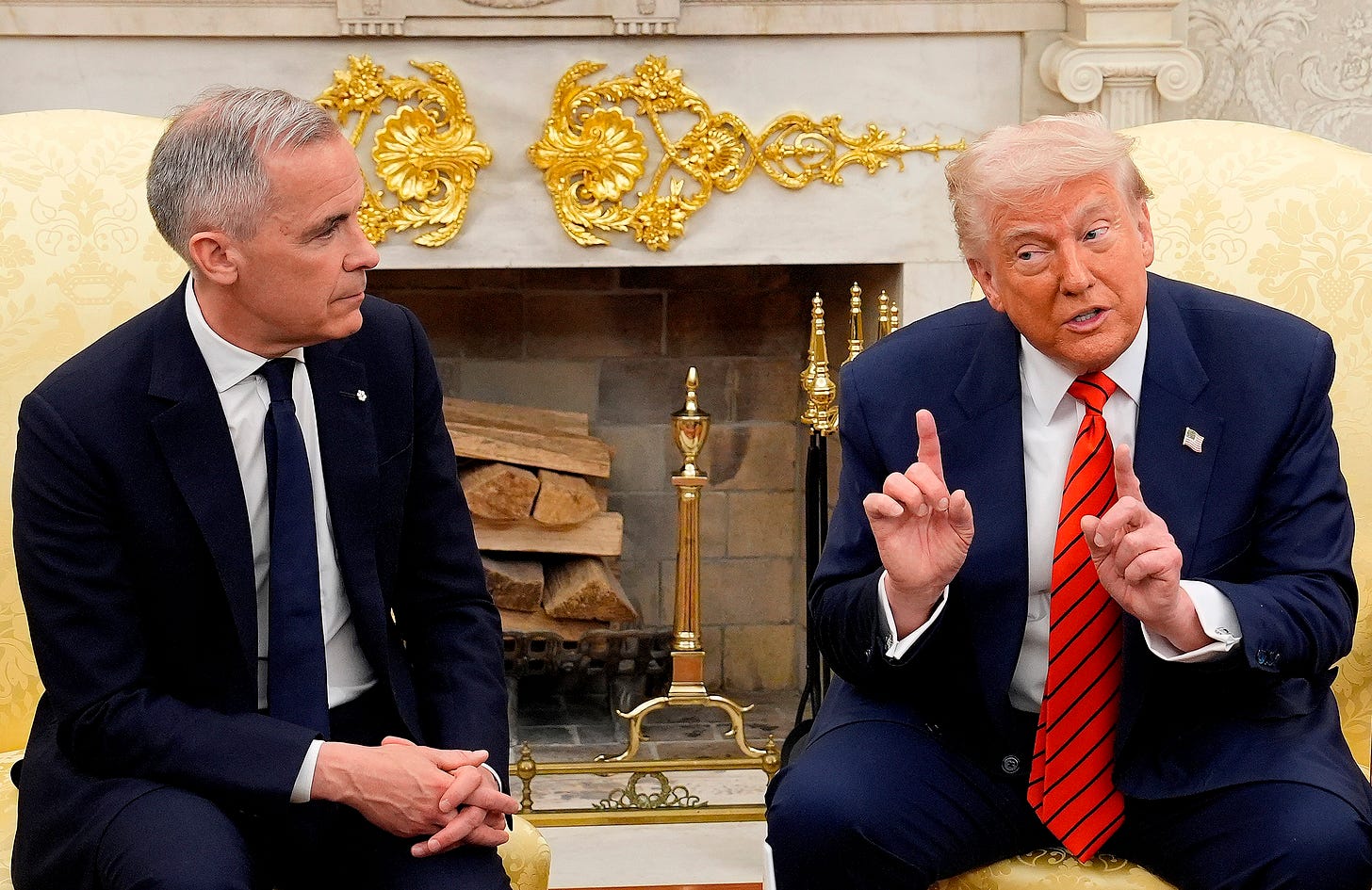Good morning, It’s Thursday, July 24th. In today’s news, Canada’s Environment Minister won’t back down on the Liberal EV mandate, the UN Court says countries can sue each other over climate change, an RCMP veteran warns Canada can’t protect itself against criminals and espionage, Canada’s supply management policy is in Trump’s crosshairs, and much more.
First time reading the daily blend? Sign up here.
Zero Emissions, Zero Logic: Inside Canada’s EV Crisis
Carney’s Liberal government is marching forward with the Trudeau-era electric vehicle mandate like it's a religious crusade, not public policy.
Under the plan, 20% of all new vehicle sales must be zero-emission by 2026, 60% by 2030, and 100% by 2035. But there’s just one problem: the math doesn’t work, the market isn’t ready, and the industry knows it.
EV sales are down. Trade tensions with Trump’s White House are up. And Ottawa’s EV purchase incentives have vanished—no timeline for when, or if, they’ll return. So what’s the plan? Apparently, there isn’t one. Environment Minister Julie Dabrusin has made it clear: scrapping or scaling back the mandate isn’t even on the table.
This isn’t policy—it’s delusion.
Auto executives, industry associations, and premiers from Ontario and Alberta are all saying the same thing: the mandate is unworkable. There’s no path to compliance short of restricting the sale of gas-powered vehicles—essentially forcing consumers into EVs they either can’t afford or don’t want. And still, Dabrusin shrugs, insisting the targets remain.
Her department claims it’s about making zero-emission vehicles “affordable and accessible.” But removing incentives while mandating sales is like banning umbrellas during a rainstorm and demanding everyone stay dry.
Industry insiders are now calling the policy what it is: a setup for failure. Even the Canadian Vehicle Manufacturers’ Association, which typically plays nice with government, says there’s “deep frustration” behind the scenes. Automakers don’t need lectures from Ottawa—they need infrastructure, demand, and a functional trade environment.
But that would require actual leadership. What they’re getting instead is ideology dressed up as climate policy.
This government isn’t listening to the people who build cars, create jobs, or manage supply chains. It’s listening to climate activists who think “just transition” is an economic strategy.
If the mandate doesn’t change, expect layoffs, plant slowdowns, and higher prices across the board. Because when government policy ignores reality, reality always punches back.
And when it does, the people who suffer won’t be the ones in Ottawa pushing mandates. It’ll be the workers on the assembly lines, the families trying to buy a car, and the small businesses stuck with the consequences.
This isn’t a green revolution. It’s a slow-motion crash. Source.
From Climate Justice to Legal Extortion: UN Court Says Countries Can Sue Each Other Over Climate Change
The International Court of Justice (ICJ) just handed climate activists and opportunistic governments a shiny new weapon—and make no mistake, it will not be used for justice but for lawfare.
In a sweeping new advisory opinion, the UN’s highest court declared that countries can now be held legally accountable for their contributions to climate change—including historic emissions—even if they’re not part of the Paris Agreement. While technically non-binding, the ruling opens the floodgates for climate lawsuits, allowing nations to sue one another in national and international courts for everything from rising sea levels to weather-related destruction.
Let’s be clear: this isn’t about science or fairness. It’s about creating a grievance goldmine for activist lawyers and global bureaucrats.
From Noble Intentions to Legal Absurdity
The case was originally sparked by Pacific Island law students concerned about rising sea levels and climate vulnerability. Their emotion is understandable—their homes are on the frontlines. But what began as a call for justice has now become a judicial Pandora’s box. The ICJ’s opinion essentially says:
Countries can be sued for their emissions—even retroactively.
Subsidizing fossil fuels or approving energy projects may breach international law.
States are liable not just for their actions but also for emissions by private companies within their borders.
Climate victims may be entitled to monetary compensation if damages can be linked to emissions.
But there is a silver lining: even the judges admit it will be nearly impossible to untangle who caused what. Climate attribution science is murky, and connecting a single cyclone or flood to the emissions of a particular country is pure guesswork.
So what does this ruling actually do?
It politicizes international law, invites frivolous lawsuits, and shifts the focus from practical climate solutions to blame games and reparations.
The Inevitable Backlash
This ruling may be celebrated today in activist circles and bureaucratic halls, but the backlash will come. The ICJ has just undermined its own credibility by stepping into partisan politics under the veil of justice.
Rather than encouraging cooperation and innovation, this opinion fuels division, resentment, and a dangerous global blame game—one where the very countries investing most in clean energy and climate adaptation are punished for having led the industrial revolution.
It’s a stunning display of short-sighted idealism, backed by flawed science, and destined to inflame rather than resolve.
RCMP Veteran Sounds Alarm: Our System Can’t Handle Today’s Threats
Canada is under siege—not by tanks or missiles, but by a shadow network of organized crime and foreign espionage that’s quietly eating away at our institutions.
According to former senior RCMP officer Garry Clement, Canada has become a “soft target.” In his forthcoming book Canada Under Siege, Clement outlines how transnational organized crime (TOC) groups and hostile foreign actors are no longer operating separately—they're converging. Fentanyl trafficking, money laundering, cybercrime, and political interference now form a single hybrid threat that our current institutions are ill-equipped to handle.
The statistics are damning: CSIS reports over 668 organized crime groups active in Canada, 45% of which operate across provinces. These organizations are increasingly working with state-sponsored entities—particularly from China—using shell companies, real estate, casinos, and cryptocurrency to launder billions. The Cullen Commission estimated annual money laundering at $45–113 billion. The system is not just failing; it's facilitating.
Meanwhile, our enforcement capabilities remain stuck in the past. RCMP cybercrime units are understaffed. Anti–money laundering enforcement is fragmented. Political will is nonexistent. Canada’s failure to implement meaningful reforms—despite repeated warnings—has left us vulnerable to exploitation by both criminals and foreign powers.
Clement doesn’t mince words: China is Canada’s most active foreign interference threat. Its strategy isn’t about stealing elections in one fell swoop—it’s about long-term institutional capture. Universities, diaspora communities, research hubs, and political offices are all targets. Russia, Iran, and India have joined the fray, using cyberattacks and disinformation to destabilize Canadian democracy from within.
Legislation like Bill C-70 and enhanced CSIS-RCMP cooperation are steps in the right direction, but they fall short of addressing the scale and urgency of the threat. As Clement warns, “We can’t keep policing yesterday’s crime with yesterday’s mindset.”
His proposed solutions are: grant CSIS and FINTRAC prosecutorial authority, establish a national AML enforcement agency, treat foreign interference as a national security crisis, and deepen intelligence-sharing with Five Eyes partners.
The longer we deny the scope of the threat, the more our sovereignty erodes—quietly, steadily, and perhaps irreversibly. Source.
Canada’s Supply Management Under Fire: Will Carney Cave to Trump’s Demands?
Canada’s supply management system for dairy and eggs is emerging as a key target in the trade negotiations between Prime Minister Mark Carney and President Donald Trump. Though overshadowed briefly by the now-rescinded Digital Services Tax, Trump has ramped up his criticism of Canada’s “extraordinary tariffs”—some as high as 400%—accusing Ottawa of treating US dairy farmers unfairly.
Behind closed doors, US officials are making it clear: Canada’s tightly controlled dairy market must open up. Trump’s team, led by Commerce Secretary Howard Lutnick, has explicitly stated that Canada must “open their market” or face escalating tariffs—set to jump to 35% on August 1.
While Carney has vowed to protect supply management, pressure is mounting. Parliament passed legislation in June to shield it from trade deals, but that hasn’t stopped growing calls from US lawmakers, including Democrats like Senator Chuck Schumer, to dismantle the system. Experts warn that maintaining it could force Canada to concede in other areas or face a broader trade war. More
Zelensky Seizes Control of Ukraine’s Anti-Corruption Agencies Triggering Backlash
Ukrainian President Volodymyr Zelenskyy has signed a controversial law granting the prosecutor general control over the country’s top anti-corruption agencies, sparking backlash from EU officials, watchdogs, and protesters who say it threatens institutional independence. Zelenskyy argues the move is aimed at rooting out Russian influence, following recent arrests of anti-corruption officials with alleged ties to foreign intelligence. The EU warns the reform could derail Ukraine’s EU accession path by undermining rule-of-law commitments. More
Canada’s Drug Problem:
United Arab Emirates Reports Seizure of 131 Kilograms of Drugs Shipped From Toronto - More
Massive Drug Bust at Canada-US Border as 187.5 Kg of Cocaine Discovered in Transport Truck - More
Poll: Most Canadians Still Think Canada is Accepting Too Many Immigrants, and Many Don't Trust Newcomers - More
French President Macron Sues Influencer Candace Owens Over Claim France’s First Lady Was Born Male - The discovery for this trial will be insane. More
Russian Lawmakers Pass a Bill Punishing Online Searches for Information Deemed to Be ‘Extremist’ - The official definition of extremist activity is extremely broad and includes opposition groups like the Anti-Corruption Foundation, created by the late opposition leader Alexei Navalny, and the “international LGBT movement.” More
Probe of Davos Founder Finds Unauthorized Spending and Inappropriate Behavior - Klaus Schwab rejects preliminary findings of misconduct, including improper travel expenses and gifts. More
Jetflicks Operators Sentenced in $37.5M Piracy Case That Undercut Streaming Industry
Five men from Las Vegas have been sentenced to up to seven years in prison for operating Jetflicks, one of the largest illegal TV streaming services in US history. The US Department of Justice says the service offered over 183,000 pirated episodes—more than Netflix or Hulu—generating millions in profits while costing copyright holders an estimated $37.5 million.
The operation used automated software to pull pirated content and host it on servers in both the US and Canada. The RCMP assisted in the investigation. Jetflicks allowed tens of thousands of paid subscribers to access copyrighted shows without permission. The case marks the first illegal streaming operation to go to trial in the United States. More
Meme Stock Mania Returns as Krispy Kreme and GoPro Shares Soar - Retail traders inspired by social media pile into stocks targeted by short sellers. More
US Home Price Hit Record High in June at $435,300 - Existing-home sales declined by 2.7 percent month over month, marking the slowest pace since September 2024. More
Magic Mushrooms Reduced Human Cellular Aging by 57%
Researchers at Emory University found that psilocybin—the active compound in psychedelic mushrooms—can extend lifespan and reduce cellular aging by up to 50% in human cells and 30% in elderly mice. In a 10-month study, aged mice showed reversed signs of aging, such as hair graying and improved physical activity, living 30% longer than controls. The compound works by activating serotonin receptors linked to aging pathways, notably increasing SIRT1 expression, which delays cellular senescence and preserves DNA integrity. This is the first long-term study to demonstrate psilocybin’s systemic anti-aging effects, suggesting it may have broad therapeutic potential beyond mental health, despite regulatory and pharmaceutical resistance. More
Astronomers Discover Giant Planet Forming Just 440 Light-Years from Earth - More
Nearly 300 NASA Scientists Sign 'Voyager Declaration' to Protest Trump Space Science Budget Cuts - More
Bryan Johnson to Sell Anti-Aging Business to Focus on “Don’t Die” Cultural Movement
Tech entrepreneur Bryan Johnson plans to sell his anti-aging nutrition company, Blueprint, to focus entirely on the “Don’t Die” movement—a growing cultural community of over 5,000 biohackers committed to defeating aging and extending human lifespan. Johnson, who tracks hundreds of daily health metrics and has conducted high-profile experiments like multi-generational plasma exchanges, envisions “Don’t Die” as more than just supplements. It’s a global lifestyle shift aiming to push humanity toward biological age “escape velocity” and redefine the future of longevity. So far, 127 local leaders have launched “Don’t Die” communities, emphasizing the movement’s rapid cultural growth and impact. More
Rockies Award High School Prospect Ethan Holliday Record-Breaking $9 Million Bonus After Selecting Him 4th Overall in Draft - More
The White House Issues an Intimidating Statement About The View Being 'Pulled Off the Air’ Over 'Irrelevant Loser' Joy Behar - This comes after Trump took credit for having The Late Show with Stephen Colbert canceled and suggested Jimmy Kimmel is next. This is very troubling. While I’m not a fan of these shows, this is not how the President of the United States should handle criticism. It’s anti-free speech and undemocratic. More
Indian Police Arrest Man Running Fake Embassy, Posing as Adviser to Micronations Like ‘Seborga’ and ‘Westarctica’
On This Day in 1969, Apollo 11 safely returned to Earth, successfully bringing back the first astronauts to ever walk on the Moon.



















Not zero emissions.